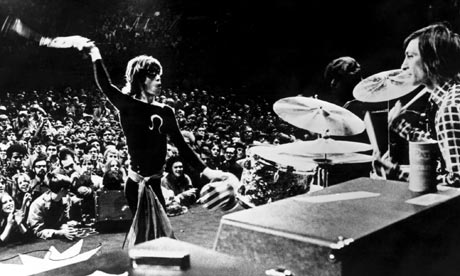It had been a while since I had seen Gimme Shelter, the 1970 documentary directed by Albert and David Maysles and Charlotte Zwerin that follows the Rolling Stones' 1969 US tour, from Madison Square Garden through hotel rooms and photo shoots, attorneys' offices and recording studios, culminating in the ill-fated Altamont Free Concert in northern California. Along the way there are donkeys, hippies, Hell's Angels and Uncle Sam hats, and a man with a revolver, stabbed as he attempts to invade the stage.
I found it startling this time. This was perhaps because lately most of the music documentaries I have seen have been cleaner, more conventional affairs – John Scheinfeld's excellent Harry Nilsson: The Missing Beatle, for instance, which interviewed the songwriter's family, friends and associates, and drew on archive footage, home movies and personal photographs to build a portrait.
Gimme Shelter, by contrast, was an example of the Maysles' association with the direct cinema movement, spurning interviews and voiceovers in favour of more spontaneous documentation, letting the action unfold without explicit comment. The camera hovers over the action, a blurred, ill-lit and intimate thing. But what I found most surprising was the way it shook my view of its subject. Of course, the Rolling Stones are a band I love, that I have danced to, driven to, worked to, that I have listened to my entire life, but it's easy to turn bands of their stature into monuments, to forget the fragility, the humanness of them. Instead, they become the Mount Rushmores of rock'n'roll – a blank-faced tribute to their greatness; we remember their size before their frailty.
Gimme Shelter made these musicians life-sized again. It was in the dirt beneath their fingernails, in the hole in the right toe of Keith's snakeskin boots, in all of the velvet, steady swigs of liquor and the thrum of a helicopter taking off into the dark, night air.
The focus of the film led, of course, to that December day at the Altamont Speedway, to the 300,000 people spilling towards a free concert, hoping for a Woodstock West; to the performances by the Flying Burrito Brothers, Jefferson Airplane, Crosby, Stills, Nash & Young and, as the sun went down, the Stones. It was an eventful day: drink, drugs and car thefts, peace signs, fights, arrests, altercations, four births and four deaths – one of which, the fatal stabbing of 18-year-old Meredith Hunter by a member of the Hell's Angels, was the headline tragedy.
Yet what have lingered with me are the film's smaller, closer sadnesses. There is a scene in which the band travel to Alabama to record Wild Horses in the legendary Muscle Shoals Sound Studios. It took three days to record: the melody stirred up by Keith Richards and Gram Parsons, the lyrics coined by Richards and Jagger, the chorus – so legend holds – written in the studio toilets.
Richards has spoken about the song's beginnings, of the sadness of going back on the road after the birth of his son Marlon, of "being a million miles from where you want to be". And he spoke of how it took on a different shade in the hands of Jagger, recently abandoned by Marianne Faithfull. "I wrote this song because I was doing good at home with my old lady," Richards said, "and I wrote it like a love song. I just had this 'Wild horses couldn't drag me away,' and I gave it to Mick, and Marianne just ran off with this guy and he changed it all around, but it's still beautiful."
The scene shows the band listening back to the song in a half-lit room. The camera takes in Charlie Watts' mouth, the empty Coke bottle perched on the stereo, Richards rolling his head back against the sofa, mouthing the words. It brings a new light to this band, this song, one coloured by the ashen tinge to their skin, the dark circles beneath their eyes, by the way Jagger sniffs, just once, at the opening line, the way he presses a bottle to his lips, runs the liquor over his teeth, and with the song's final notes, fans his hands wide, in a slow, soft mingling of sadness and pride.







